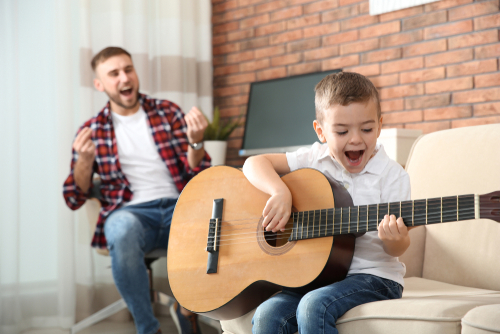
With so many choices of activities that children can participate in, it may feel overwhelming to choose the right one. These activities can become lifelong passions, extracurriculars for a college application, or a large part of your child’s personality.
As you begin exploring your options, you will inevitably see music lessons of all kinds, from group lessons at a studio to in-home private learning. While each version has different benefits, music lessons are always a great choice for your child. Not only will they learn a skill in terms of music itself, but these lessons can build confidence and character while improving intelligence.
With so many choices of activities that children can participate in, it may feel overwhelming to choose the right one. These activities can become lifelong passions, extracurriculars for a college application, or a large part of your child’s personality. As you begin exploring your options, you will inevitably see music lessons of all kinds, from group lessons at a studio to in-home private learning. While each version has different benefits, music lessons are always a great choice for your child. Not only will they learn a skill in terms of music itself, but these lessons can build confidence and character while improving intelligence.
Children of all ages are drawn to music in some capacity- the instant gratification of an instrument producing sound captivates even an infant. As children grow and become interested in how these instruments work, music is an obvious outlet for energy and curiosity. But turning that play into a skill requires your child to practice, accept failure, and work toward a goal. In this way, music is more than just a fun activity, but also a way for children to learn self-discipline, independent problem solving, and additional skills they will use into adulthood.
Kids music lessons are also good for children from a developmental perspective. Studies have shown that learning a musical instrument, especially through long-term and consistent lessons, leads to improved spatial-temporal reasoning skills that help with learning math and science. Children enrolled in music lessons also show superior reading comprehension skills and memory skills when compared to their classmates.
As you guide your child toward adulthood, music lessons offer a way for them to develop independence and skills they will use forever, all while having fun and expressing themselves through a creative practice. The key to this balance will be choosing an environment that is comfortable for your child while still offering structure and knowledge that helps them grow.
Why You Should Enroll Your Child In Music Lessons
Parents choose to enroll their children in music lessons for kids for a variety of reasons. Every child can benefit from music lessons in some way, even if they gain different skills than their classmates in the same lessons.
Some ways in which music lessons benefit children include:
- Music lessons encourage brain development that aids with academic skills like memory and reading comprehension.
- Children who take music lessons have been shown to have a higher IQ as a result.
- Learning an instrument can foster physical skills like coordination and fine motor movements.
- Interaction with music teachers and peers offers an opportunity for children to gain social skills and form meaningful connections.
- The process of perfecting a piece or learning a new scale teaches children discipline, patience, and perseverance.
- Children feel confident when they are able to master a new skill and demonstrate that skill to their loved ones.
- Music can help children learn about and understand other cultures they may not be exposed to at home.
- The creativity and self-expression used in playing music helps kids discover a sense of self and step outside of their comfort zones.
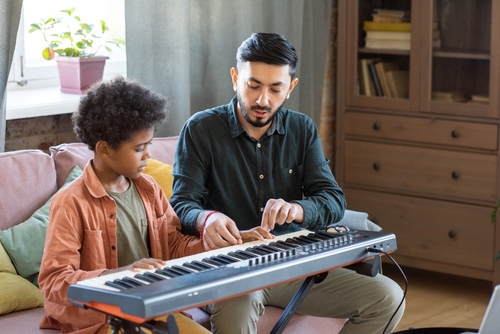
Whether your child needs to learn a specific set of skills or simply needs a creative outlet, music lessons for kids can help them grow.
Having Music Lessons Improve Memory And IQ In Children
While music is an art form and can bring about explosions of creativity in children, it is also an extremely precise practice. Learning music in a structured lesson and absorbing its principles has been shown to improve cognitive skills in a meaningful way, leading to higher IQs in children.
Neurologists have long seen that people who participated in music lessons from a young age have markedly different brain activity and volume. Several academic studies also show a similar result: students exposed to music have stronger verbal and mathematical skills, as well as better memory and cognitive flexibility when tested.
Learning to play an instrument requires an element of memory that works like a muscle until it is strengthened. To recall a chord progression or an entire sonata is to use memory in a repeated way that becomes a habit over time, so it makes sense that memory improves in response to these lessons.
But years of practice aren’t necessary to see these benefits. Just a few weeks of lessons have been enough to show an increase in IQ in numerous studies. It is clear that learning even the basics of music offers children the chance to improve their cognitive function. Over several years, this progresses further and changes the physical makeup of their brains so that a neurologist may be able to identify a child who has taken music classes based on a single brain scan.
Taking Music Classes Teach Self-Discipline In Kids
Children are not known for their self-control at most ages, and this is often a primary motivator for parents enrolling them in any extra-curricular activity. To be able to accept failure or lack of skill and dedicate yourself to improving, including taking the initiative to practice even when there is no consequence, is a skill that we must learn as we grow up. In a world of fast-paced technology and instant gratification, it can be difficult to help our children gain this skill.
Music lessons for kids offer a natural way to develop self-discipline, even in young children. The fun and creative element of music is motivating and makes children want to practice outside of their normal lessons. Structured weekly practices and goals like recitals or moving to a new level can help children stay focused on their education and motivate them to work on their skills during their own time.
As part of their music classes, children must continue to build new skills all the time, which prevents them from becoming complacent. Learning all of your guitar chords does not mean you will know how to move between them with ease, and knowing how to move between them does not mean you will remember how they are used together in a song. New lessons come up each time a child works with a teacher, and there is always more they can be learning to reach the next level.
The dedication and self-discipline a child learns through music lessons easily transfers to other areas of their lives, whether it is academic work or simply cleaning their room. These skills are a foundation for their adolescence and adulthood when work may become more difficult or there is no external force demanding it is done. Children who develop these skills early will be successful at not just their musical education but anything they set their mind to in the future.
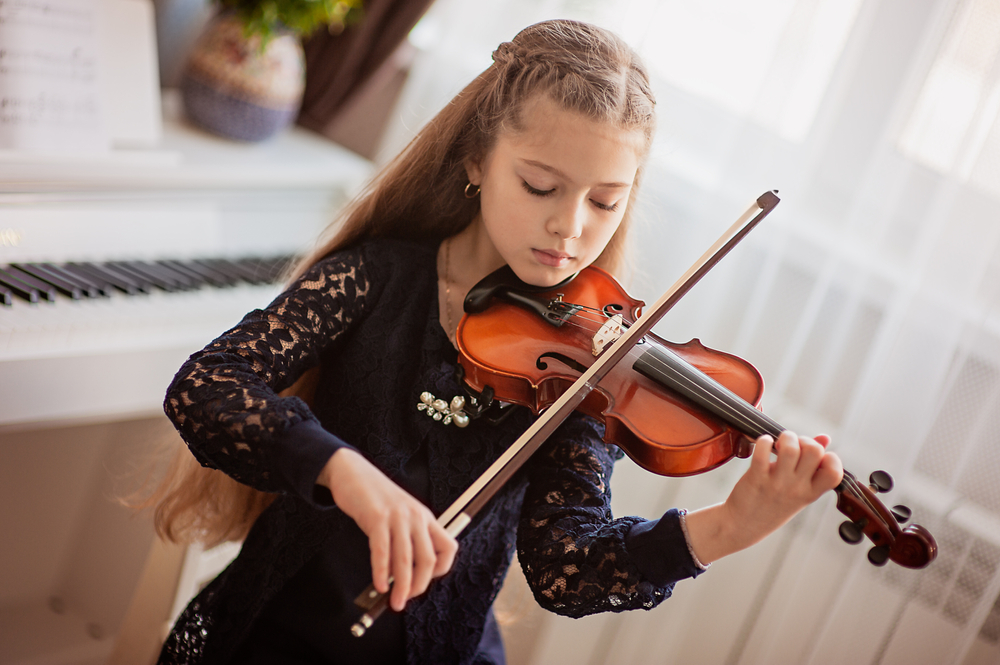
Enrolling in Music Lessons Develop Coordination & Motor Skills In Children
To play any instrument requires some amount of coordination and movement of the body, typically the hands, the feet, and the mouth. The ability to synchronize the body as the brain is working is something that we develop over time, and children are learning through everything they do, including music. Learning an instrument promotes both fine and gross motor skills and coordination.
Fine motor skills, which typically pertain to the use of the hands and more delicate movements, are critical for many aspects of life. From brushing your teeth to undoing a button, you are using fine motor skills constantly each day. Most instruments require fine motor skills as your child’s fingers move between keys and strings or hold an instrument in place. Much of this becomes muscle memory over time, but that is only after you develop these skills and the ability to control your body at the minute level required to play an instrument.
Gross motor skills are related to larger movements, like walking, but these can still come into play for certain instruments. Holding up something large like a tuba requires gross motor skills, as does a foot pedal like you may see on an organ.
All of these skills are based on coordination and the ability of the body and brain to work together quickly and seamlessly. Playing a musical instrument of any sort encourages this brain activity and body movement in a way that quickly becomes natural to children.
Kids’ music lessons have been particularly beneficial for children who are extremely energetic and physically active or struggle with attention spans, as music requires reflecting on every movement. Engaging in developmentally appropriate music offers a combination of physical movement, the use of existing motor skills, and a need to slow down and think about each movement in a way that builds good habits.
Taking Music Classes Improve Math, Reading, And Comprehension Skills Of Kids
Music lessons are fun for children, but also engage most of their major brain functions and serve as a learning activity. In fact, students who have taken music classes have been shown to score significantly higher on exams than their peers across subjects like math, science, and reading. This is, in part, because students engaging in music lessons may have more discipline for studying and increased cognitive function.
When it comes to math and science, spatial-temporal awareness is a large part of improving scores. Music lessons for kids can help with understanding patterns and how various factors relate to one another, which becomes important in these subjects. In many ways, music is similar to math: time signatures, beats per minute, and formulaic progressions are equations of sorts, and learning music helps kids commit these to memory. These skills become vital for any scientific endeavor that requires understanding or predicting a pattern.
Reading comprehension is also an important component of music lessons as children learn to read sheet music and quickly turn that into action. This, along with the memory skills used in music, make students who take music classes test better across English and similar subjects as well. Music has been shown to make the brain fire at faster speeds because of the importance of keeping time while playing, so it makes sense that the brain is also firing at this faster speed when turning words into information and understanding in other contexts.
Attending Music Lessons Teach Cultural And Historical Awareness In Children
Across every culture in the world, there is some sort of music. While the instruments and songs may be different, it is a uniting force that doesn’t require a shared language. Music classes for kids provide children insight into other cultures and their histories that they may not gain through typical academic learning.
Even if a student is learning an instrument common in their community, that instrument may share similarities with those of other cultures. By learning to see those similarities and accept them, children learn to accept differences in others. It is also an opportunity to expose kids to cultures they may be altogether unfamiliar with or even introduce another language in a translated version of a song.
Musical history can also be woven into traditional kids’ music lessons at every turn. Understanding where specific movements came from, who wrote classic pieces, and why certain instruments are popular or not can provide historical context that helps broaden a student’s horizons. For example, songs can be considered a primary source in many studies of history, showing us how a culture lived or interacted with another.
Music can also form especially strong connections between people.The connections formed through music can also be especially strong. Two who play the same instrument could play an entire song without havipeopleng to speak a single word of the same language. And while that scenario isn’t likely to happen often, kids’ music lessons offer connections in a community that a child might not have had otherwise.
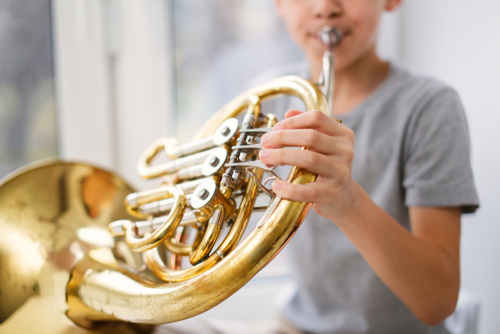
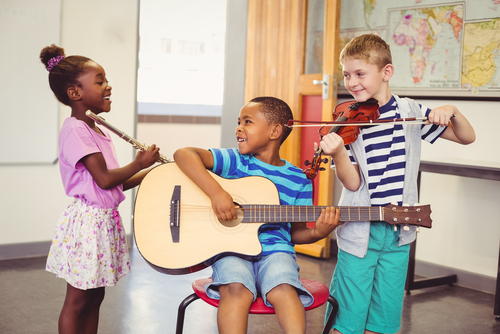
Signing Up for Music Classes Encourages Self-Expression & Creativity
In many ways, music lessons for kids are about structure, especially as students work towards learning the basics of an instrument. But as children gain these foundational skills, they also gain the ability to express themselves creatively through their instrument.
Creativity and self-expression can show up in a number of ways. Kids’ music lessons may include the opportunity to improvise, testing out different notes and how they sound together. Many students take this a step further and can even compose their own pieces eventually! But more commonly, creativity can come through simple things like choosing new genres to explore or adding small flourishes during a performance.
Outside of the music itself, music classes can encourage creative thinking in other areas of life as well. Children may think harder about things like the lyrics of songs they hear and become interested in writing in that way or pay special attention to a film score. Understanding that these art forms are just compositions of small skills, like the ones they learn, can help children feel empowered to express themselves in a range of ways.
One of the great things about music lessons is that every child may get something different out of them. For some, the ultimate form of self-expression is to improvise or compose a piece of music on their own, while others get lost in the feeling of following a piece exactly as written. Each of these is a form of self-expression that can be encouraged and leave your child with a more creative and expressive mind.
Music Lessons Increase Listening & Social Skills In Children
Whether a music class is in a one-on-one setting in the home or a larger class, the interaction it offers a child can be hugely beneficial for their social skills. This may simply mean exposure to other people who can engage in conversation, but it is often rooted in improved language skills as well.
Listening to and understanding music involves hearing sounds you may not have processed before and learning to separate sounds effectively. Even when there is a significant amount of background noise, students who have taken consistent music lessons have been shown to be better at listening and distinguishing sounds.
These listening skills are useful from a linguistic perspective when it comes to learning and understanding language, but it also makes a child more attuned to listening in general. This improvement in the physical element of listening often leads to an improvement in social listening, including the ability to follow instructions and hold a conversation.
As children are better able to learn and absorb new information, they may also become better friends and better people to be around. These social skills can be beneficial for everything from making friends to interacting with co-workers in the future.
Music lessons for kids improve a child’s ability to both hear and listen, and they offer kids a social connection that allows them to practice these skills and apply them to the real world. Ultimately, doing well in school or work involves not just hard skills and abilities but also social connections and emotional intelligence that can be facilitated early on.
Continuing Music Lessons Help Kids Become More Independent
The goal of most parents is to raise a child who becomes a self-sufficient adult, able to provide for themselves and live a happy and fulfilling life. Fostering that self-sufficiency and independence is often difficult, but music lessons for kids can help. While they will always be guided by skilled teachers, any activity not led by the parents helps children to form a sense of self away from the home, which is a good basis for independence.
There is also a sense of responsibility built into music lessons that can be important in this area. No one can play your instrument for you in the same way homework and other tasks can be aided; you either learn it or you don’t. By giving children something to do that they are solely in charge of, they will learn to rely on themselves and understand that they control their own success or failure.
Part of becoming independent is having the confidence to tackle new challenges and take responsibility for your own actions as well. Consistent music lessons help to develop these characteristics, as students may struggle with a piece before finally mastering it and then moving on to the next challenge. As children see themselves evolve in this way, they gain confidence that ultimately becomes the fuel for independence.
Students may also learn the consequences of their own actions during music lessons. Failing to practice can result in consequences or a lack of progression, or an error can manifest during a live performance. Learning to handle a failure and make changes the next time offers a sense of intrinsic motivation for students over time.
When Is The Best Age To Learn A Musical Instrument?
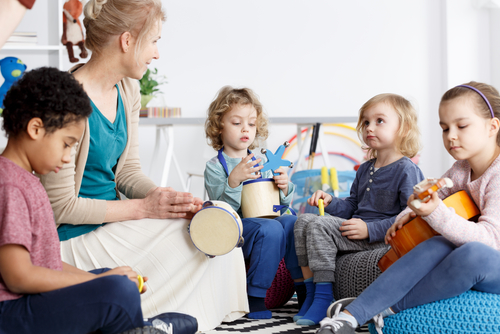
If you’ve dreamed of raising your own little Mozart, you may wonder when to start. The best age to learn a musical instrument depends on a number of factors.
You need to consider which developmental milestones your child has already reached, their physical stature (especially height), their strength and ability to hold certain instruments, their willingness to learn, and perhaps most importantly, their individual personality.
Even once you have considered all of these and decided that your child is ready, you and your child need to decide what kind of instrument will be the best to begin with. This can be tricky, and you might need to navigate the possibility of your child not being quite ready for the instrument they really want to play.
Most children are ready to learn at least some musical instruments by the time they are 5 years old. Some children will be ready earlier than that, and some will need to wait longer. Generally speaking, you should aim to begin somewhere between your child’s fourth and seventh birthdays. But if your child is older or younger than that and interested in music classes for preschoolers or older groups, it’s worth looking into and giving it a try
Things to Consider Before Enrolling Your Child For Music Lessons
So your child has finally reached their personal best age for learning a musical instrument. Chances are you, the parent, might not know how to teach your child how to play the instrument they have chosen. The next best option is to find a music class for kids in your area.
Before you enroll your child in music lessons, consider the following:
- Developmental Milestones: Is your child developmentally ready? In order to be successful in music lessons, your child will need to have developed important fine motor skills, as well as the ability to sit still for an extended period, listen carefully, and follow multi-step directions.
- Willingness: Does your child want to begin lessons? Are they willing to learn the instrument? Are they looking forward to practicing, cleaning their instrument, and potentially doing basic instrument repairs?
- Familiarity: Does your child have some background familiarity with the instrument? Their first lesson should not be the first time they see the instrument or have any interaction with it. Your child should also meet with the teacher ahead of time to get rid of any apprehension or anxiety.
- Teacher personality: Does the teacher seem like they are a good match for your child, or can you foresee a clash of personalities?
- Location: Is the teacher nearby, or will you have to pay extra for a longer commute? Are they available online so that you don’t have to travel and can continue lessons no matter where you are?
- Budget: Remember that you are paying not only for the instrument and the lessons, but also for maintenance of the instrument as well. Does the class fit into your family’s budget? Are you committed to the expense of encouraging your child’s musical journey?
The Financial Costs Of Music Lessons
It is no small thing to decide to learn a musical instrument, and that includes the cost. Some kinds of instruments carry a lower financial burden than others, but when you enroll your child in music lessons to learn a new instrument, you are committing to taking on all of the associated costs.
While kids’ music lessons may take a chunk out of your budget, you are also providing your child with an experience that will last them a lifetime. Once they know how to play a musical instrument, it is unlikely they will ever forget. They will be learning a skill that can help them in all areas of their life, including academics: research shows that students who have musical skills perform better on math and reading tests.
Don’t be too worried about the cost though; music lessons can fit into almost any budget. The key is figuring out what works best for you and your family.
Cost of Musical Instrument
Some instruments are less expensive than others. After all, a flute is much smaller and simpler than a piano.
Instruments on the more expensive end of the range are those that are larger, more complex, or more rarely played.
- Piano: The average cost to buy an upright piano is between $3000 and $4500, not including the costs of moving the piano or tuning it. An upright piano is the kind you are most likely to see in a home, as they are cheaper and take up less space than a baby grand or grand piano.
If $3000 sounds too much but your child is still set on plonking out a concerta, a keyboard may be a good compromise, going for as little as $100 for a beginner. The main difference is that a piano is a woodwind instrument, while a keyboard is electric. Some other mid-range instruments include the following:
- Cello: This beautiful upright woodwind instrument is large and unwieldy but is an important part of any string orchestra. For a beginning student, a cello at the lower range of the spectrum may cost around $2000 to buy outright.
- Wind instruments: This varied group of instruments are, for the most part, the most portable instruments available. They can be split into two subgroups, woodwinds and brass. Woodwinds include the flute, oboe, saxophone, and clarinet. Brass instruments include the trumpet, horns, and tuba. While some wind instruments are actually quite inexpensive (such as recorders, which you can buy for as little as $10), most of them are in the mid-range, costing up to $1000 for a beginner.
Some of the least expensive instruments include the following:
- Guitar: As long as you’re not going for Jimi Hendrix’s Stratocaster, guitars are largely affordable. You will most likely want to start your child with a student-level acoustic. If so, there are affordable options sized for a child starting at around $200.
- Ukeleles are another great, inexpensive string instrument, costing around $50 to $100. These instruments were first popularized in Hawaii but have become much more widespread, and their small size makes them perfect for younger, smaller students.
- Violin: A beginner violin can be purchased for as little as $200, although the more sophisticated your little violinist becomes, the more expensive his violin will become.
Renting vs. Buying
Whether you rent or buy your instrument will depend on you, your child, and your needs. There are pros and cons to both.
When to Rent an Instrument
- Your child isn’t sure what instrument to commit to.
- Your child isn’t done growing. As children grow in size, so will their instruments, especially things like guitars and violins.
- You’re mostly ready to commit to music lessons, but you want to give it a trial run first.
- You have a smaller budget.
When to Buy an Instrument
- Your child is fully committed to playing a specific instrument.
- You want to make a more long-term investment.
- You know of a good place to buy a new instrument, or you know a reputable dealer who can sell you a used one.
- You have the budget required for buying an instrument.
Meet in the Middle
Some sellers have rent-to-own programs that allow you to pay for your instrument on a payment plan with the goal of eventually owning the
instrument.
Maintenance
Don’t forget that any instrument you buy will require some upkeep. That could mean tuning, cleaning, parts replacement, and sometimes doing instrument repairs. Be sure to research the frequency and type of maintenance your child’s chosen instrument requires monthly and yearly, and apply it to your overall music instrument budget.
Lessons
Now that you have chosen your child’s instrument, it’s time to think about how your child will learn how to use it. There are different ways to learn based on what works best for your family.
- Private lessons are often provided in the child’s home. This is a great option for a student who will benefit from individualized attention. However, it is usually one of the most expensive forms of music lessons.
- Group lessons are a less expensive option because you share the cost of the instruction with others. There are, however, certain instruments for which this set-up doesn’t really work, such as the piano.
- Online lessons are more available now than ever. This option can be more cost-effective than other forms of lessons. The drawback is that the teacher will not be present for physical instruction, so your child will need to follow directions well.
Regardless of the style of music lesson you choose, be sure you choose a teacher that your child is matched well with. Learning how to play an instrument should be fun! You are making a big investment, so choose a teacher who will help to make your child want to continue their lessons.

Parents’ Willingness To Support A Child’s Musical Interest
As with most things, a child is more likely to succeed if their parents are involved in their musical journey. Children need support and encouragement, as well as some accountability as they embark on learning an instrument.
While music teachers are there to teach, parents need to be available for support outside of the times that the child is actively in lessons. Here are the most important aspects of parents’ involvement in supporting their children’s musical interests.
Be Committed
Just as you expect your child to be committed to learning their musical instrument, parents need to commit to the process as well. You need to ensure your child has all they need to succeed, including the instrument itself, the ability to have access to lessons, and designated time to practice at home.
Keep Them Accountable
While you never want to push your child too hard and force them to do something they hate, kids need accountability. If they commit to taking music lessons and learning to play an instrument, they need a parent’s support to keep them accountable. Ensure they practice at home by making it fun and giving them time to do so, and keep them accountable to fulfill their commitment.
Be Encouraging, but Don’t Helicopter
Sports parents are notorious for pushing their kids hard and trying to live vicariously through them, but music parents can be this way too. Don’t do it!! You should absolutely encourage your child and be their biggest cheerleader, but don’t helicopter parent and hover every single time they practice or talk about playing an instrument. Don’t push your own aspirations on your child, but encourage them and support them in the ups and downs of learning an instrument.
Recognize Their Individuality
As a parent, you need to be willing to support your child’s individual interests as a musician. Just because you played piano doesn’t mean they have to play piano. Or just because you wish you had learned to play the guitar doesn’t mean that’s where they need to start. Recognize their individual likes and dislikes, as well as their strengths and weaknesses. Support who they are as a person and a musician and encourage them to pave their own path and walk their own journey.
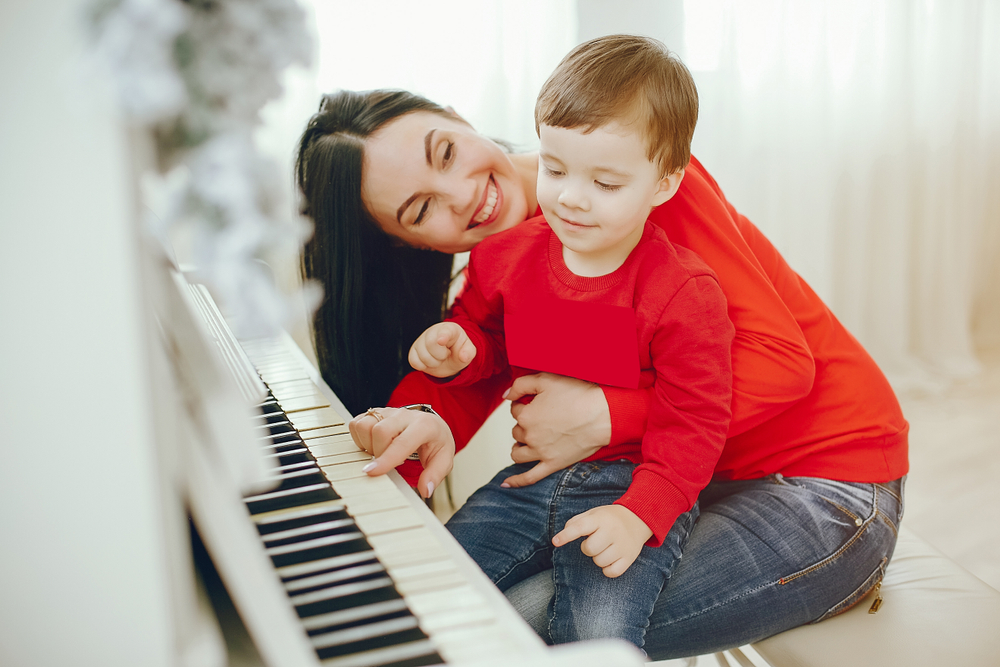
Figuring Out A Child’s Interest In Playing Instruments
When it comes to figuring out a child’s interest in music, it’s often far simpler than we make it. Kids love music. That’s a simple, undeniable fact. If you continue to make music fun, kids will continue to enjoy it. If they learn new things and experience personal successes, they’ll want to continue learning. If music lessons and playing an instrument are presented well, kids can’t help but love it and succeed at it. However, if you spend too much time gauging their interest in a particular instrument, you’ll find a reason not to continue with music lessons. But the truth of the matter is that taking music lessons is good for everyone and everyone has the capacity to enjoy them and do well with them.
More significant than figuring out a child’s interest is making sure they’re ready for music lessons. Take into consideration their age, attention span, and motor skills to determine their readiness for actual lessons. If you find they aren’t quite ready for instrument lessons, you can still expose them to music in a variety of forms and let them try out a number of different instruments early on.
If your child is ready for lessons and you’re trying to gauge their interest, again, let them explore different instruments and see what they enjoy the most. You can also take into consideration what types of music they enjoy and might want to learn how to play. Some kids may wish to play several instruments, in which case they should begin with piano or violin to get a strong foundation of musical knowledge and basic skills.

Next Step: Choosing The Right Instrument For Your Child
Once you’ve decided to enroll your child in music lessons, your next step is choosing the right instrument. There is a lot to consider when exploring different instruments, such as the child’s age, height, physical strength, personality, and more. Some children will be extremely committed and passionate from the start, while others may need a bit more encouragement at home.
Generally speaking, the best instruments to begin with are piano and violin because of the foundational knowledge and skills those instruments will introduce. However, if your child has his or her heart set on playing something else, be sure to discuss it with a qualified music teacher before purchasing the instrument and related gear. While commitment and passion will take kids very far in learning how to play an instrument, there may be some intricacies of certain instruments that you aren’t aware of. Explore all your options so that you can set your child up for success from the start of their musical journeys.
Regardless of what instrument your child decides to play, being supportive and getting them quality lessons will help them enjoy the experience.
